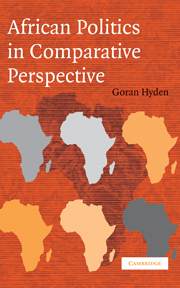Book contents
- Frontmatter
- Contents
- Acknowledgments
- 1 The Study of Politics and Africa
- 2 The Movement Legacy
- 3 The Problematic State
- 4 The Economy of Affection
- 5 Big Man Rule
- 6 The Policy Deficit
- 7 The Agrarian Question
- 8 Gender and Politics
- 9 Ethnicity and Conflict
- 10 The External Dimension
- 11 So What Do We Know?
- 12 Quo Vadis Africa?
- References
- Index
12 - Quo Vadis Africa?
Published online by Cambridge University Press: 05 September 2012
- Frontmatter
- Contents
- Acknowledgments
- 1 The Study of Politics and Africa
- 2 The Movement Legacy
- 3 The Problematic State
- 4 The Economy of Affection
- 5 Big Man Rule
- 6 The Policy Deficit
- 7 The Agrarian Question
- 8 Gender and Politics
- 9 Ethnicity and Conflict
- 10 The External Dimension
- 11 So What Do We Know?
- 12 Quo Vadis Africa?
- References
- Index
Summary
Where Africa may be heading – the question asked in the title of this chapter – is an issue that has become increasingly urgent and important to Africans and outsiders alike. The vast majority of Africans are no better off than their parents were. Despite struggling hard to make a living, they are caught in webs of relations of dependence that are becoming more and more costly to sustain. Those who really wish to break out of these affective relations are frustrated because there is no formal and predictable system in place to do so. Foreign investors and aid agencies share much of that frustration. They want to contribute, but their funds become constant prey to well-placed individuals – investment partners or public officials – for whom they constitute an attractive opportunity to make a quick gain. Even donors who have maintained a constant optimism about Africa and the difference that their own contributions can make have become increasingly skeptical about the future. For instance, after decades of espousing an almost unbounded optimism regarding the prospects of policy reform, the World Bank (2000) is now questioning whether Africa will really be able to “claim the twenty-first century.”
Although they may come at the answer from different directions, when asked today about the root of the problem that the region faces, Africans and foreigners increasingly tend to share the view that it is politics. The political sphere long held the promise of a better future for locals as well as foreigners.
- Type
- Chapter
- Information
- African Politics in Comparative Perspective , pp. 252 - 274Publisher: Cambridge University PressPrint publication year: 2005

